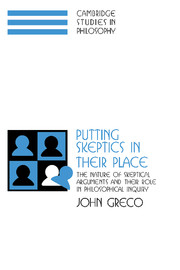 Putting Skeptics in their Place
Putting Skeptics in their Place Book contents
- Frontmatter
- Contents
- Preface
- 1 The Nature of Skeptical Arguments and Their Role in Philosophical Inquiry
- 2 Skepticism about the World: Part One – Reconstructions
- 3 Skepticism about the World: Part Two – Dismissive Responses
- 4 Skepticism about the World: Part Three – Dualism, Realism, and Representationalism
- 5 The Argument from an Infinite Regress of Reasons
- 6 Hume's Skepticism about Unobserved Matters of Fact
- 7 Agent Reliabilism
- 8 Agent Reliabilism and the Relevant Sense of “Relevant Possibility”
- 9 Moral and Religious Epistemology
- Bibliography
- Index
9 - Moral and Religious Epistemology
Published online by Cambridge University Press: 03 November 2009
- Frontmatter
- Contents
- Preface
- 1 The Nature of Skeptical Arguments and Their Role in Philosophical Inquiry
- 2 Skepticism about the World: Part One – Reconstructions
- 3 Skepticism about the World: Part Two – Dismissive Responses
- 4 Skepticism about the World: Part Three – Dualism, Realism, and Representationalism
- 5 The Argument from an Infinite Regress of Reasons
- 6 Hume's Skepticism about Unobserved Matters of Fact
- 7 Agent Reliabilism
- 8 Agent Reliabilism and the Relevant Sense of “Relevant Possibility”
- 9 Moral and Religious Epistemology
- Bibliography
- Index
Summary
In this last chapter I want to sketch how the methodology of strong particularism can be extended to moral and religious epistemology. I do this by way of three illustrations. In Part I of the chapter, I look at work by Plantinga and Alston in religious epistemology, and I show how these authors effectively engage in an indirect application of the methodology. Both authors argue that objections to the rationality of religious belief trade on assumptions that, if true, would lead to skepticism in the empirical realm as well. As a result, the objections against religious belief are determined to be unsound. Also as a result, positive suggestions for the epistemology of religious belief emerge. We will see how Plantinga defends the general idea that beliefs about God might be noninferentially justified, and how Alston develops this line of thought in a theory of religious perception. The general structure of Alston's discussion is as follows: Objections to religious perception trade on an inadequate understanding of perception in general; such objections, if sound, would make even empirical perception impossible. Once an adequate theory of empirical perception is in place, however, the possibility of perceiving God becomes a live option in religious epistemology.
In Part II of the chapter, I want to do for moral perception what Alston does for religious perception. Drawing on the results of Chapters 2 through 8, I argue that traditional objections to moral perception misunderstand the nature of perception in general.
- Type
- Chapter
- Information
- Putting Skeptics in their PlaceThe Nature of Skeptical Arguments and their Role in Philosophical Inquiry, pp. 220 - 254Publisher: Cambridge University PressPrint publication year: 2000


